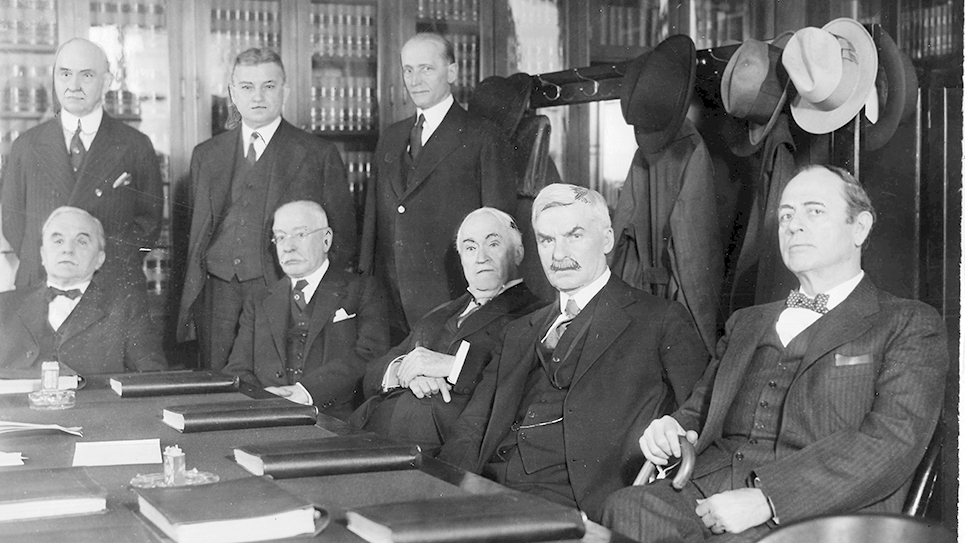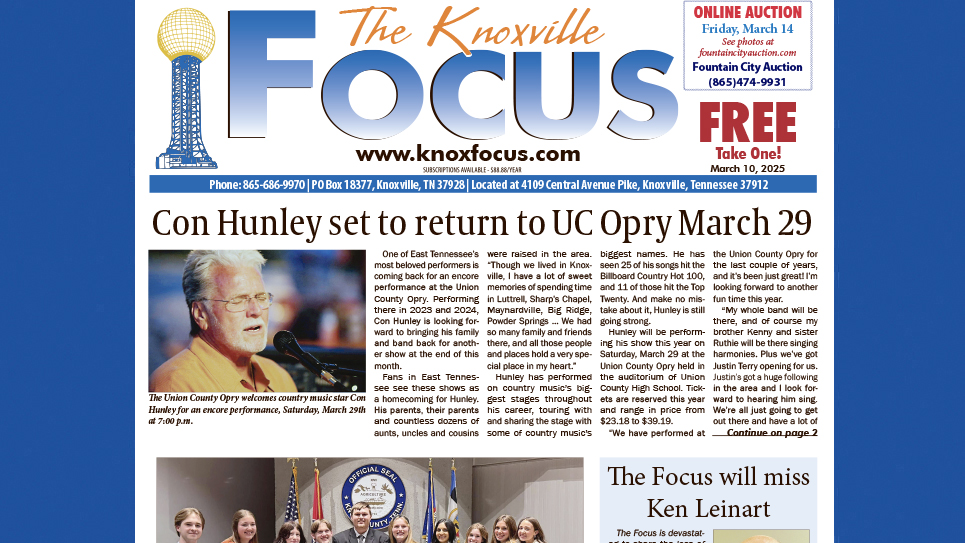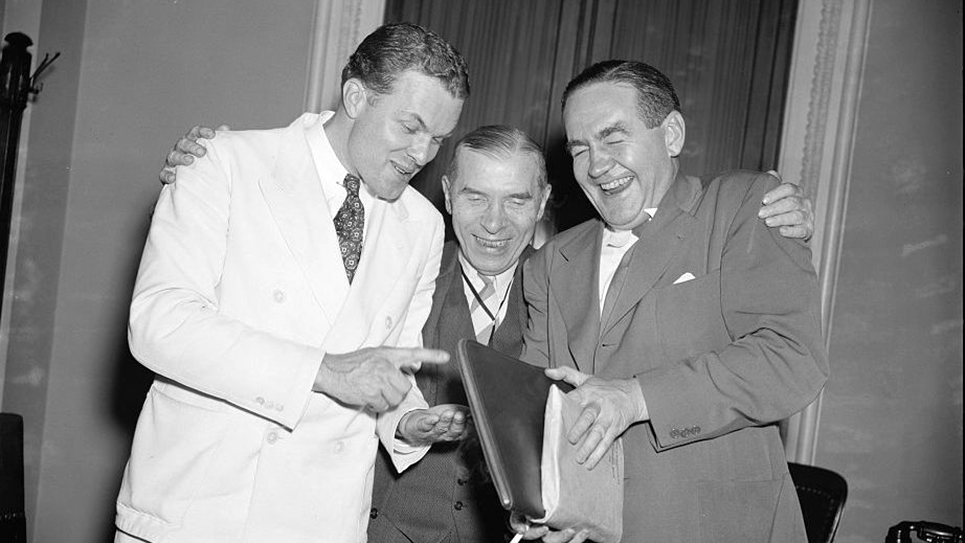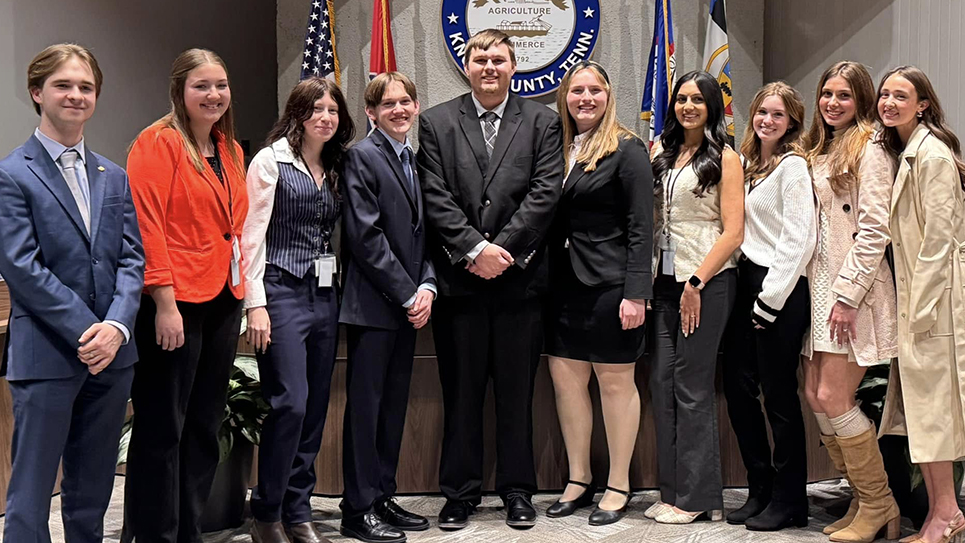Southern Statesman: Lee S. Overman of North Carolina
By Ray Hill
Lee Slater Overman was a fixture in North Carolina politics from the turn of the century until his death. White-haired and portly, Overman dressed the part of a Southern statesman and was an adept speaker at a time when stump speeches still mattered. By the time he died, Lee Overman was thought by many observers to be something of a relic of the Old South. Lee S. Overman moved from the bottom to the top of the political pile in the Tar Heel State through the best means of climbing the political ladder: starting at the bottom rung and moving up slowly, but steadily. Overman was known for taking delight in his work and his deep affection for his colleagues in the U.S. Senate was readily apparent even during the hottest debates. Lee Overman never allowed his tongue to spew vitriol nor make any kind of a personal attack on a fellow senator. Senator Overman kept his good humor and grace even during the midst of one of the Senate’s most bitter confirmation battles. President Herbert Hoover had nominated Judge John J. Parker of North Carolina to serve on the Supreme Court of the United States and Overman backed the candidacy of the native Tarheel jurist even though the nominee was a Republican.
Overman became the secretary to Zebulon Vance, a politician who was profoundly opposed to Reconstruction in North Carolina. Vance, a man with a thick head of hair and a bushy mustache, was one of the most notable Southern leaders during the Civil War and afterward. Equally eloquent in putting pen to paper as he was to speech, Zeb Vance had first been elected governor in 1862. When Vance returned to the governor’s mansion in 1877, he brought Lee S. Overman with him. Following his service as governor, Vance was elected to the United States Senate. For a year, Lee Overman was the secretary for Vance’s successor as governor, Thomas Jarvis. Overman left the governor’s office to begin the practice of law in his hometown of Salisbury.
During his 28 years in the U.S. Senate, Lee S. Overman was known as a strong supporter of President Woodrow Wilson, as well as one of the first senators to urge the adoption of prohibition of alcoholic beverages. As a senator, Overman was known for being an advocate for “good roads” and education. Throughout his long service in the Senate, Overman served the entire time alongside Furnifold M. Simmons, who was the political boss of North Carolina’s Democratic Party. The two men had much in common; both had been born in 1854, both were native North Carolinians, and both had been educated at Trinity College (the forerunner of Duke University). Simmons had first been elected to the United States Senate in 1901 and Overman followed two years later. For the next 28 years, the two comprised a formidable team for the Tar Heel State inside the U. S. Senate. Overman and Simmons had even been born the same month, January, although Lee S. Overman was seventeen days older than his senior colleague. The life and careers of F. M. Simmons and Lee S. Overman ran parallel to one another for many decades.
Senators Simmons and Overman parted political company during the 1928 presidential election. F. M. Simmons was bitterly opposed to the nomination and election of New York Governor Alfred E. Smith. Smith was a big-city Catholic with an urban point of view, which was alien to much of the more rural South. Al Smith was also a proud and unapologetic member of Tammany Hall, the notorious political organization in New York City. Oddly, although F. M. Simmons was the political boss of North Carolina, he believed Tammany to be corrupt and contemptible. Most of all, Al Smith was perhaps the most notable foe of prohibition in the country at the time, which fueled Senator Simmons’s opposition to Smith’s presidential candidacy. Simmons did the unthinkable, especially for the architect of having restored the Democratic Party to its prominence once again, by bolting and publicly refusing to support his party’s presidential nominee.
The desertion of F. M. Simmons pained his friend Lee S. Overman who supported Al Smith, but North Carolina fell into the Republican column that year. The advent of the Great Depression helped to seal the political fate of not only Herbert Hoover but also F. M. Simmons who remained unrepentant. Simmons was defeated in the Democratic primary after serving 30 years in the United States Senate. Simmons was due to retire on March 4, 1931, but the senatorial duo was broken by the death of Lee S. Overman. They remained friends until the end.
Lee Overman’s entrance into elective politics began in 1882 when he was elected to North Carolina’s House of Representatives. Overman was continually reelected and was eventually elected Speaker of the House in 1893. Overman began his first political campaign seeking election to the North Carolina State House by advocating prohibition, a stance that concerned many of his friends, who pointed to the fact his home county of Rowan had voted against prohibition the year previously. Friends and supporters warned Overman his stance might prove to cost him the election. Despite the warnings, Overman doubled down and worked all the harder, never budging from his support of prohibition. Much to the surprise of many, Lee Overman won the election.
Lee S. Overman was the Democratic nominee for the United States Senate in 1896 but lost due to the insurgence of Populists and Republicans winning a majority in North Carolina’s state legislature. Overman was defeated by Jeter C. Pritchard. Overman very much wanted another opportunity to best Senator Pritchard six years later, but he faced two opponents to become the Democratic nominee. Locke Craig, later elected governor, and Cyrus B. Watson contested the nomination, and it took fifty-one ballots before Lee S. Overman was declared the Democratic nominee. Democrats had won back the legislature and Overman was elected to the United States Senate with 138 votes to only 24 for Senator Pritchard.
Perhaps Overman’s most notable achievement in the Senate was his sponsorship of the act which bore his name; the Overman Act expanded the powers of the President during a time of war. President Woodrow Wilson sent a personal note to the North Carolina senator, writing, “It is admirable the way you have been handling these important bills, and I thank you with all my heart for standing by the bill which bears your name without any compromise of any kind. You are a splendid fighter.”
Wilson was highly popular in the South and when Overman was running for reelection in 1914 in the first campaign in which Tar Heel State residents would choose their own senator through popular election, the President urged voters to return him to office. President Wilson released a letter asking North Carolinians to give Lee Overman “their highest kind” of endorsement in the election. Overman was an important figure during the Wilson Administration, as he was the chairman of the Senate’s Rules Committee, as well as the acting chair of the Judiciary Committee, and a ranking member of the Appropriations Committee. Senator Overman was a stalwart in pushing through measures to help the administration during the First World War. Nor did Overman forget the folks back home; the senator was very active in passing agricultural measures for North Carolina’s farmers.
President Wilson’s confidence in Lee Overman was apparently very high. At the personal request of the president, Senator Overman headed a special committee to investigate lobbying activities in Washington, D.C.
Even in his later years, Overman was an energetic man. One staff member, W. W. McDonald, who worked for the senator for 11 years, recalled the senator’s daily routine. “He got to the office about nine o’clock every morning. And he didn’t leave until about six in the evening. His energy was a continual source of amazement to me and everybody about him.
“He would go home, read the newspapers and chat with his family while he listened to the radio. That was his routine day after day when the Senate was in session.” McDonald added, “He was one of the kindest men I ever knew and sometimes he mixed his good deeds with a keen sense of humor.”
McDonald recalled one of the hottest days of a summer gone by when he wanted to play baseball with friends over the weekend. “It was over 100 in the shade,” McDonald recalled. McDonald’s plans were interrupted by a telephone call from Senator Overman who said, “Come over to the office, I’ve got some work to do.” W. W. McDonald hurried to the Senate Office Building and chatted with Overman for a couple of hours, wondering when they would get busy. McDonald remembered Senator Overman looked at his watch and told him, “I knew you might get sunstroke if you played baseball. We old fellows have got to watch out for you wild youngsters.”
There was no outward indication the aging senator was ailing. Overman had been working in his office and had made calls at various government departments on behalf of constituents before becoming violently ill. Senator Overman was stricken with an “indisposition” for a few days, which was not believed to be serious. Apparently, the senator was more seriously ill than thought as he suffered a stomach hemorrhage. After blood transfusions and rest, the 76-year-old Overman seemed to be recovering when he suffered another hemorrhage and died at one o’clock in the morning on December 22, 1930.
It fell to 76-year-old Senator F. M. Simmons to make the official announcement to his Senate colleagues that Overman had died. His ordinarily whispery voice could barely be heard inside the Senate Chamber as Simmons notified the Senate of his junior colleague’s passing. Simmons sadly said he and Lee Overman had been friends for 65 years and insisted the bonds of their long friendship remained strong until the end of Overman’s life. The silence inside the Senate was almost eerie as Simmons spoke.
Lee S. Overman’s mortal remains were taken to a cemetery in Salisbury where he was mourned by the high and mighty, as well as the common folk. One journalist wrote there had been no eulogy to send off the senator, as “none was needed.” North Carolinians had learned over the past 28 years what the people of Salisbury had known already, the faithful nature of Lee S. Overman. The people of Salisbury had filled the country Methodist church long before the appointed hour of Senator Overman’s funeral. Folks dropped whatever they had been doing to pay a final tribute to a man they considered a friend and wished to honor one last time. The balcony of the little church was filled with Black citizens who had liked Overman. As the procession slowly made its way to the cemetery, men took their hats off and women bowed their heads out of respect for the dead senator. At the grave site, even more people gathered who had been unable to squeeze into the confines of the church. Newspaper reporter Robert Thompson wrote, “The whole of Salisbury stopped for a few minutes this afternoon to say goodbye to its Senator.” A delegation from both Houses of Congress followed the body of their former colleague to the graveside. Among those was Tennessee’s Kenneth McKellar. Overman’s body was borne to his grave by American Legionnaires. The Reverend W. W. Staley was one of the surviving members of the Class of 1874 at Trinity College with Lee Overman. Dr. Staley said simply, “All his life everybody that knew Lee liked him. He had such a fine character.”
One of the most notable sons of North Carolina, Josephus Daniels, publisher and owner of the Raleigh News & Observer and secretary of the Navy under President Woodrow Wilson, sent a letter of condolences to the senator’s widow. “For more than forty years your honored husband and I have walked together in devoted friendship. . .”
The bonds of the heart that bind one to others are the greatest gift that God can bestow upon anyone.
© 2024 Ray Hill







